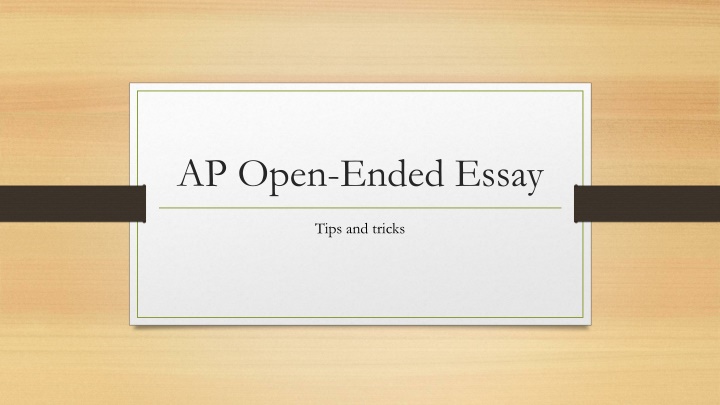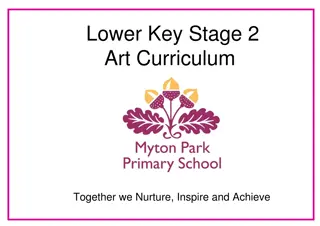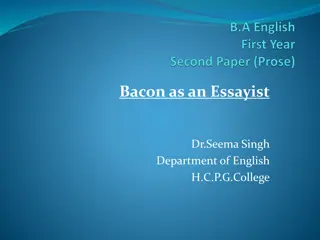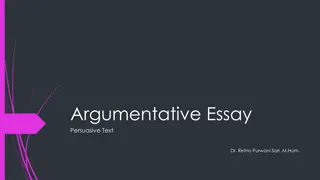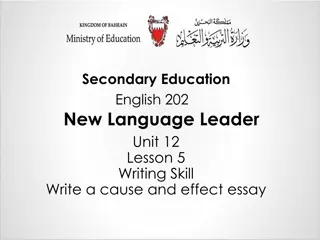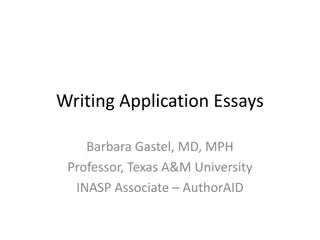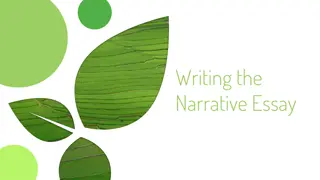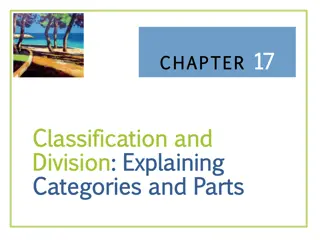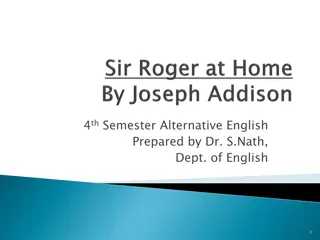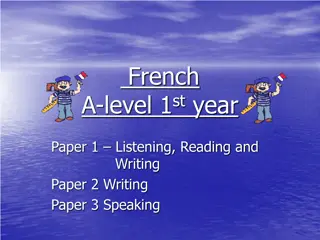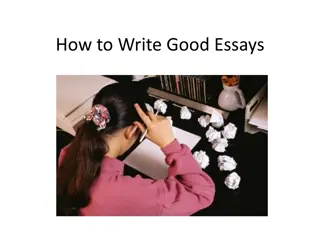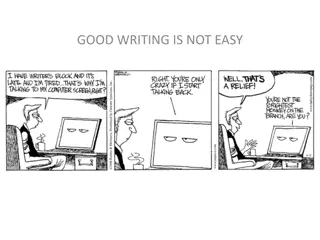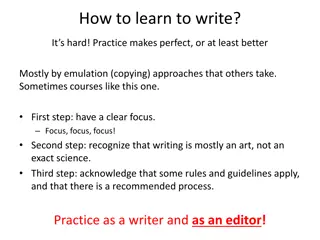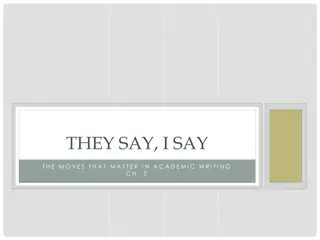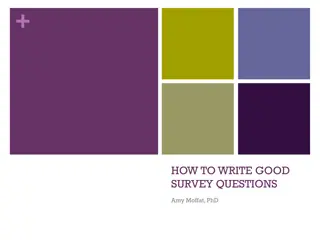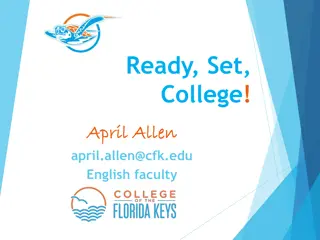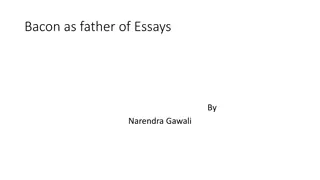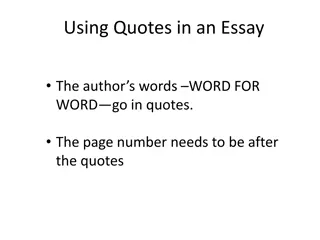Mastering the Art of Writing AP Open-Ended Essays
Enhance your AP open-ended essay writing skills by incorporating specific evidence from the novel, detailing your examples, maintaining thematic focus, and avoiding vague responses. Emphasize the importance of a clear introduction, multiple detailed paragraphs, and precise responses to the prompt for a well-structured and compelling essay.
Download Presentation

Please find below an Image/Link to download the presentation.
The content on the website is provided AS IS for your information and personal use only. It may not be sold, licensed, or shared on other websites without obtaining consent from the author.If you encounter any issues during the download, it is possible that the publisher has removed the file from their server.
You are allowed to download the files provided on this website for personal or commercial use, subject to the condition that they are used lawfully. All files are the property of their respective owners.
The content on the website is provided AS IS for your information and personal use only. It may not be sold, licensed, or shared on other websites without obtaining consent from the author.
E N D
Presentation Transcript
AP Open-Ended Essay Tips and tricks
The approach When going into a trial situation, if you were the lawyer, you wouldn t want to give vague, generalized statements about humanity unless you specifically related them to the case. Same with the essay. Be sure to use specific evidence from the novel. And just as in a trial, the MORE specific the evidence (think CSI- blood evidence for DNA, clothing fibers, dirt samples from footprints ) the better the essay will be supported.
The beginning Always include AUTHOR and TITLE in your introduction, as well as a succinct but detailed answer (1 sentence) to the prompt- this is your thesis. Don t include the WRONG author!!! Or Misspell it!
CAREFUL! Be careful when reading the question. If it asks to choose a character or a setting or a conflict, do not organize your response by discussing 3 characters (for 2 paragraphs) a =1 ALSO- ONLY WRITE ABOUT 1 BOOK
How much detail? Essays should ALWAYS have multiple paragraphs. You should ALWAYS use at least 3 supportive examples, and each should be DETAILED not vague or vacuous. It will seem as though you never read the book if you are generalizing your answer. Even if you only remember SOME details (like you forget the name of the town of Maycomb), you should still give as many SPECIFICS as possible (like the fact that all the white people live IN town and the black people and poor people live by the dump).
Prompt Precision Each paragraph should also tie into theme- use your topic and concluding sentences to maintain focus on this. Your thesis should also introduce the thematic ideas and not just the literary techniques. This needs to be EXPLICIT! (Use the wording of the prompt) Mimic the language of the prompt- i.e. Describe how the author manages to give these internal events the sense of excitement, suspense, and climax usually associated with external action. In your analysis (commentary on details used for support), include statements such as Janie s initial desire to be like the bees on the flowers is fulfilled when she finally feels connected to her third husband, Tea Cake, in a loving and caring way. Although this is a mental transformation, the audience has been awaiting her realization throughout much of the novel, which created a sense of suspense and anticipation. This leads to a more hopeful ending for Janie s story.
Supportive Paragraphs You should also focus your response on the author s use of the literary techniques (he or she wanted to create a feeling of .; uses _________ to highlight the characteristics of _______; the diction supports the theme of ) If you are tempted to focus on the reader and his or her response, you are focused slightly off the literature and onto the audience. Just think that all literature was CREATED for a purpose, a message of the author or the society from which it came, and that the effects will vary, so steer clear of that! FEEL FREE TO USE A LITERARY THEORY TO HELP!
Rubric Examine a generic version of the rubric now. What are the requirements for an upper-level essay?
Prompts 1998. In his essay Walking, Henry David Thoreau offers the following assessment of literature: In literature it is only the wild that attracts us. Dullness is but another name for tameness. It is the uncivilized free and wild thinking in Hamlet and The Iliad, in all scriptures and mythologies, not learned in schools, that delights us. From the works that you have studied in school, choose a novel, play, or epic poem that you may initially have thought was conventional and tame but that you now value for its uncivilized free and wild thinking. Write an essay in which you explain what constitutes its uncivilized free and wild thinking and how that thinking is central to the value of the work as a whole. Support your ideas with specific references to the work you choose.
Prompts 2003. According to critic Northrop Frye, Tragic heroes are so much the highest points in their human landscape that they seem the inevitable conductors of the power about them, great trees more likely to be struck by lightning than a clump of grass. Conductors may of course be instruments as well as victims of the divisive lightning. Select a novel or play in which a tragic figure functions as an instrument of the suffering of others. Then write an essay in which you explain how the suffering brought upon others by that figure contributes to the tragic vision of the work as a whole.
How to Prepare You will need to review and study novels. Plot elements and details are always important here, as you can use plot to help support your argument. However, don t JUST summarize the plot in the essay.
Novels 9thGrade: 10thGrade To Kill a Mockingbird 1984 Romeo and Juliet Life of Pi The Odyssey Othello Of Mice and Men Frankenstein Dr. Faustus
Novels continued 11thGrade The Great Gatsby The Crucible A Raisin in the Sun 12thGrade Their Eyes Were Watching God Siddhartha Heart of Darkness Inferno Canterbury Tales Brave New World The Importance of Being Earnest Hamlet IRP
